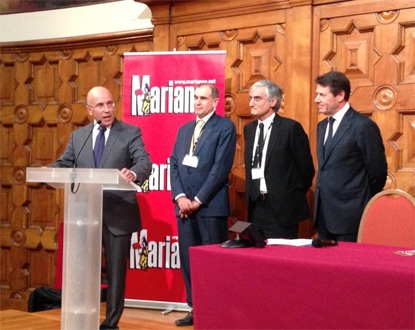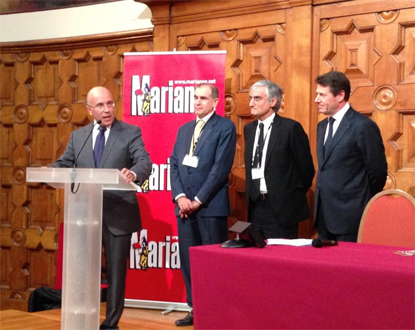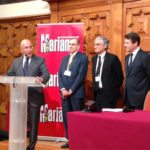Alain Bauer, a recognized expert in security and crime, and the President of the General Council of Alpes-Maritimes, Éric Ciotti, debated this Thursday on whether authorities could control crime money.
These two subjects are necessarily closely related.
 In another auditorium of the CUM (Mediterranean University Center), Eric de Montgolfier, William Bourdon (lawyer), and Abdeslam Aboudrar (co-founder of Transparency Morocco, President of the General Instance for Corruption Prevention) address the topic “Corruption, the world’s first budget?”.
In another auditorium of the CUM (Mediterranean University Center), Eric de Montgolfier, William Bourdon (lawyer), and Abdeslam Aboudrar (co-founder of Transparency Morocco, President of the General Instance for Corruption Prevention) address the topic “Corruption, the world’s first budget?”.
Éric Ciotti begins the debate by stating that the answer to the question was obvious, that authorities should control it, but do they have the means to do so? And as the President of the General Council likes to remind us: “Does crime pay or not?”.
For this debate, the two speakers are surrounded by Frédéric Ploquin, the moderator for this hour and a half, but also an investigative journalist specializing in crime, police, and intelligence.
He already sets the stage by showing the crime figure in France: 150 million euros per year! The two speakers generally agree on the many points developed at the end of the afternoon, such as eliminating cash: “Reduce the payment threshold from 3000 to 1000€”. “Our financial system has become completely virtual. 67 billion dollars produced by rogue banks, the equivalent of so-called normal banks”. An alarming observation.
According to these figures, organized crime money today represents 2000 to 3000 billion euros globally, or 3 to 5% of the world’s resources, worse still, it represents France’s annual production! But it is also an economic weight in some regions of the world that live off criminal and delinquent activities: “Globalization favors crime money. We have tools, but the networks are well organized.”
For the two debaters, they need to hit criminals where it hurts: their wallets. Prison no longer scares them, it is essential to seize their assets (vehicles, real estate). The Warsmann Law of 2010 provides for the reestablishment of seizing assets from crime. In 2011, there were 8000 seizures totaling 200 million euros. Taking this dirty money, laundering it to put it into development and research against these mafia groups.
For Alain Bauer, society has sadly accepted the normality of corruption. Worse, the crisis would have a boosting effect on economic crime because the rules are loosened to restart growth. “Tax optimization, a nice word for tax fraud”. “We need to go faster”. Something not necessarily easy when we know that criminals advance faster than authorities.
The issue of tax havens inevitably comes back to the forefront. For Alain Bauer, “compliant bankers are needed. All banks have offshore accounts”. Many banking institutions have been subject to seizures except in France. A striking example, out of 3000 Russian banks, 60% would be controlled by mafia groups. The specialist then questions whether “we have the cleanest banks in the world?”. The number of countries affected by financial controls has decreased. According to Eric Ciotti, “today there is greater transparency”.
A great question posed by Frédéric Ploquin, but why did it take France so long to become interested in dirty money. The answer is simple, recent awareness even though the phenomenon is older. Al Capone was not caught for banditry but indeed during a tax audit.
Alain Bauer does not want people to fall into stereotypes. The poorest departments are where crime is the lowest. In 2002, when unemployment fell, crime exploded. He believes that “if there is money for illegal activities, there is surely money for legal ones”. Also a revision of the 1970 Law that does not currently allow distinguishing between different categories of drug trafficking: “Huge confusion where every criminal must be judged based on their misdeeds”.



